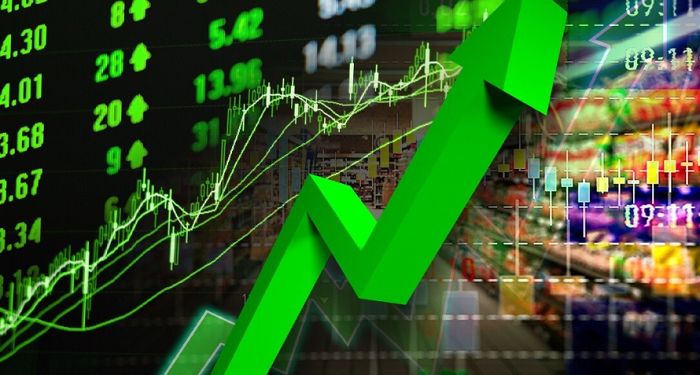A spirited rally on the Nigerian Stock Exchange gathered momentum this week, with investors pouring fresh capital into equities and propelling the market’s total value upward by approximately ₦396 billion. The robust surge reflects growing confidence among market participants, fueled by positive corporate earnings, macroeconomic signals, and strategic portfolio repositioning ahead of earnings season.
The All-Share Index (ASI) led the charge, registering notable gains from key stocks across the financial, consumer, and industrial sectors. Large-cap banking stocks, particularly those of tier-one institutions, drew significant attention, as did consumer goods manufacturers responding to easing inflation and improving production outlooks. Industrial stocks, notably in the cement and construction materials space, also posted solid gains, supported by signs of renewed infrastructure activity and stable demand.

Market analysts attribute the flow of capital to several concurrent factors. Improved macroeconomic indicators—which include signs of moderating inflation and heightened foreign exchange market stability—have supported a more constructive outlook. News of declining consumer price pressure has prompted optimism that policy rates may soon relax, encouraging investors to re-enter the market ahead of an expected interest rate cycle shift.
Corporate earnings projections are also playing a key role. Several quoted companies have either released ahead-of-forecast interim results or have provided upbeat earnings guidance, prompting a shift in portfolio allocations. Investment managers note that revised profit outlooks from sectors like banking and consumer staples have sparked steady buying momentum through local pension funds and foreign institutional accounts.
Foreign investor sentiment is another factor behind the bullish run. While net inflows have remained modest compared to other frontier markets, foreign portfolio managers have been selectively increasing exposure to Nigerian equities, particularly in blue-chip stocks with strong liquidity and robust earnings. Analysts point to renewed interest potential, should global funding conditions ease.
Retail investors have also contributed to the rally, buoyed by renewed market visibility and confidence in equity recovery following a protracted period of stagnation. With mounting expectations of a pick-up in dividend payments and special board resolutions, retail activity has become animated, leveraging mobile trading platforms for faster market access.
On the supply side, several firms announced share buyback programmes or intentions to float bond offerings collateralized by equities, signalling a shift toward shareholder value enhancement strategies. These moves were seen as confidence votes that helped sustain capital inflows and heighten market resilience despite periodic profit-taking.
Despite the exuberance, some portfolio managers urge caution. They point out risks that include policy-making uncertainty—especially around anticipated interest rate cuts and inflation forecasts—and lingering foreign exchange fragility. Additionally, global risk factors such as commodity price swings and rising debt levels could weigh on market sentiment and capital flows.
Sectoral performance has varied. The banking index led with impressive gains of nearly 1.1 percent as investors returned to financial stocks hoping for upward earnings revisions and stable liquidity metrics. The industrial goods index rose around 0.8 percent, boosted by optimism over renewed construction and infrastructure spending. The consumer goods sector also held firm, supported by improved margins from easing input costs and supply chain normalization.
Conversely, the oil and gas sector remained relatively flat, caught between global price pressures and local distribution dynamics. Similarly, the telecommunications sector showed mixed performance due to investor concerns over rising competition and infrastructure spending ahead of new license requirements.
Trading volumes have risen in tandem with the market’s upward trajectory. Average daily turnover increased, driven by robust activity from institutional investors and retail traders alike. Analysts believe sustained volume is critical to avoiding shallow rallies and ensuring that gains are underpinned by broad-based participation.
In Upper West African terms, Nigeria’s market recovery positions it as a standout within the region’s financial markets. While some frontier economies have stagnated or declined, the Nigerian Exchange is witnessing renewed liquidity and investor interest—suggesting that broader economic structural reforms are bearing fruit for capital market recovery.
Looking forward, market watchers expect the rise to continue into the mid-year, subject to a few key triggers. These include projected interest rate cuts by the Central Bank, second-quarter corporate earnings releases, and improved foreign exchange liquidity. A pronounced turn in macroeconomic data or global commodity trends could further amplify momentum or prompt a recalibration.
To sustain the rally, commentators emphasize the importance of ongoing structural reforms. Advances in fiscal discipline, public debt management, regulatory consistency, and infrastructure projections are seen as essential to reinforcing investor confidence and encouraging continued capital inflows. They argue that the private sector’s role in financing growth via the capital market hinges on a stable, predictable economic environment.
In summary, a buoyant sentiment continues to sweep through the Nigerian stock market, driving up its total market value by ₦396 billion. The upswing is supported by a favorable mix of corporate performance, macroeconomic indicators, and renewed participation from both foreign and local investors. But as the rally unfolds, cautious optimism prevails. The market’s resilience into the second half of the year will depend on how domestic policies evolve, how global factors play out, and whether earnings delivery can keep pace with current expectations.
Support InfoStride News' Credible Journalism: Only credible journalism can guarantee a fair, accountable and transparent society, including democracy and government. It involves a lot of efforts and money. We need your support. Click here to Donate
